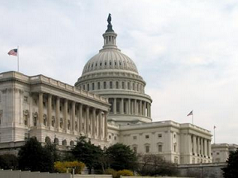House to Mark Up Rate Reg-Blocking Bill

The smarter way to stay on top of broadcasting and cable industry. Sign up below
You are now subscribed
Your newsletter sign-up was successful
The House Communications Subcommittee has scheduled a markup Feb. 11 on three bills, including one that would prevent the FCC from using Title II to regulate broadband rates and another that would help smaller cable ops.
H.R. 2666, the No Rate Regulation of Broadband Internet Access Act, is a stand-alone form of a rider that did not make it on the omnibus budget bill. While FCC Chairman Tom Wheeler says his new Open Internet order is not an effort to regulate rates, Rep. Adam Kinzinger (R-Ill.), who authored the bill, wants to make sure that does not happen now or under a future chairman.
A markup (amendments and, if possible, a vote) is also planned on the Small Business Broadband Deployment Act (it yet to be assigned a bill number), authored by Rep. Greg Walden (R-Ore.) that would make permanent the temporary exemption for small businesses from new enhanced disclosure requirements under the Open Internet rules.
The FCC recently extended the waiver but took no action on making it permanent while it awaits from the Office of Management and Budget on the new information collection requirements per the Paperwork Reduction Act.
Republicans complained at the time that the FCC should not kick that can down the road but should instead make the waiver permanent now.
The third bill being marked up is H.R. 1301, the Amateur Radio Act, which has to do with use of amateur radio equipment.
The subcommittee held a legislative hearing on the bills Jan. 12 where fans and foes weighed in.
The smarter way to stay on top of broadcasting and cable industry. Sign up below
In that hearing, Republicans argued that given that both the President and FCC chairman Tom Wheeler said new Title II based Open Internet rules should not regulate access rates, codifying that should be a bipartisan no-brainer of sorts. They also said that the FCC should have made the small business exemption permanent last month, and expanded it from the FCC definition of "small" ISP—100,000 subs or fewer—to the SBA definition of 500,000, particularly given that only one comment had been filed opposing that, and that one was at the 11th hour.
Democrats agreed with no traditional rate regs, but argued the bill's language was too broad and could sweep away consumer protections from monopoly rates, anticompetitive interconnection charges and even rural broadband subsidies under the Universal Service Fund. They also argued that while the FCC may ultimately decide to make the small business exemption permanent, doing so by congressional fiat would be premature.
Contributing editor John Eggerton has been an editor and/or writer on media regulation, legislation and policy for over four decades, including covering the FCC, FTC, Congress, the major media trade associations, and the federal courts. In addition to Multichannel News and Broadcasting + Cable, his work has appeared in Radio World, TV Technology, TV Fax, This Week in Consumer Electronics, Variety and the Encyclopedia Britannica.

